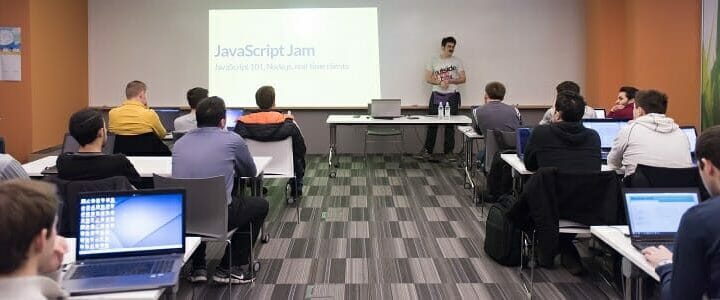For veterans interested in learning how to code websites without spending 18 months or more going to school, there is a new VA-approved 14-week immersive program just for veterans called Code Platoon. Established in 2016, it was only recently approved by the VA for GI Bill eligibility on February 26, 2018.
Paying for the course
Students using their Post 9/11 GI Bill get their tuition paid by the VA directly to the school; students get the normal monthly housing allowance (calculated on the zip code for the campus located in Chicago, IL) and the book stipend. The school also offers scholarships up to $10,500 for veterans not having enough GI Bill benefits or any left to cover the cost of the course. The scholarships offered by this non-profit school are supported in part by major companies like Amazon, Motorola and Boeing.
To learn full-stack web development in 14 weeks means the program is intense – up to 14-hour days, six days a week. An optional internship program extends the course to 32 weeks and gives the student more real-world coding experience which looks good on a resume.
And the curriculum doesn’t stop with teaching coding. They also include interpersonal skills training to transition veterans from the military environment into the civilian workplace, along with a career prep training block of instruction. Once graduated from the program, students have an industry-ready resume, a professional profile they can post online and over 100 hours of mock interview practice answering questions focused on the technical end of web development and behavioral-type scenario questions commonly asked during interviews.
Web Development Curriculum
The web development part of the course is broken down into four parts:
- Programming Languages – Ruby, Javascript, HTML and CSS
- Data storage and manipulation – SQL
- Frameworks – Ruby-on-Rails and React.js
- Industry Best Practices – Git, application testing, object-oriented design, APIs and troubleshooting
Daily Class Schedule
The course starts before even stepping into the classroom by each student completing up to 100 hours of work at home. This establishes a student knowledge baseline from which the school can start teaching coding.
Class starts at 8am with an instructor lecturing for 45 minutes to 1 ½ hours depending on the subject. The rest of the morning is spent working on coding projects with an instructor present to answer questions. In the afternoon there is another lecture with more coding projects that keep students working well into the evening. As the course progresses, there is less time spent on lecture and more time coding projects – both as individuals and in team/pairing situations.
Web development as a career
According to the Bureau of Labor Statistics (BLS), web development will grow at the rate of 15% between 2016 and 2026 – a much-faster-than-average percentage. As far as pay, in 2017 the median pay was $67,990. The lowest 10% earned just over $38,000. According to Code Platoon, their eight 2016 graduates are now each earning $65,000 working as full-time software developers – a figure in line with BLS estimates.
As far as the work, developers usually end up specializing in one of three areas:
- Back-end development – website framework construction
- Front-end development – website appearance
- Webmasters – maintenance of websites
In smaller companies, a developer may work in all three areas.
While jobs are plentiful for all graduates of Code Platoon, veterans having valid security clearances have even more opportunity – there are more than 4,000 web development jobs (at the time of writing) here at ClearanceJobs.
If you enjoy being in the company of others sharing experiences similar to yours, want to learn coding fast, and have your GI Bill pay for the course (and internship), this program could be for you. Check it out at Code Platoon.



